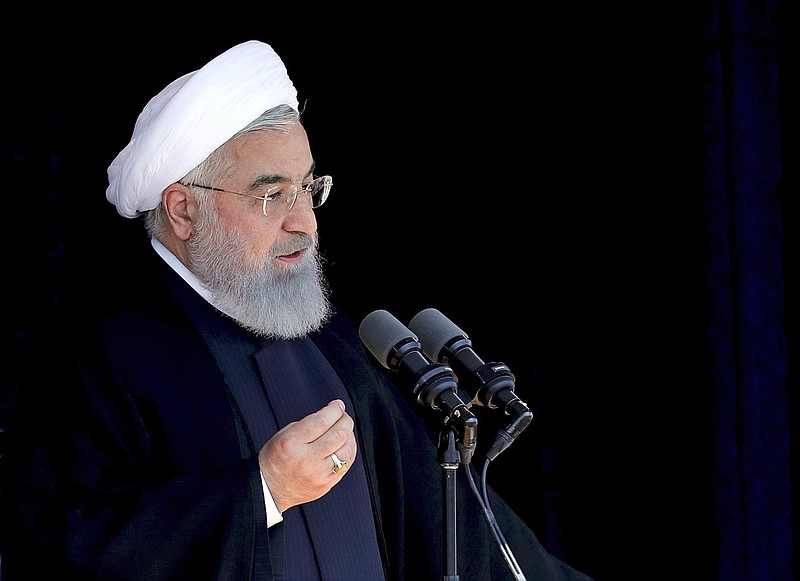On the whole, Sen. Bob Corker, R-Tenn., told Times Free Press editors and reporters last week, he'd just as soon President Donald Trump keep the Iran nuclear deal that Corker had opposed when the Obama administration negotiated it in 2015.
However, if the president were to choose to exit the deal, "I'm not sure it's the end of the world," he said.
On Tuesday, Trump made it official: He will pull the U.S out of the agreement. He then signed a presidential memorandum to reinstate within 90 days nuclear sanctions on the country, "the highest level of nuclear sanctions" that could be imposed, he said.
Any country that assists Iran in its nuclear program also could be sanctioned, he said.
"We will not be held hostage to nuclear blackmail," Trump said. "We wanted to send a critical message: The U.S. no longer makes empty threats."
The president had until Saturday to decide whether or not to keep sanctions in place.
The Joint Comprehensive Plan of Action had delayed Iran's development of nuclear weapons but did not - or at least has not - kept them from developing ballistic missiles and from funding terrorism elsewhere in the world.
Trump had excoriated the agreement since he was a presidential candidate, calling it a "disaster" and "insane," but until Tuesday as president had signed the necessary statements waiving sanctions to keep the U.S. in the deal.
Corker, as chairman of the Senate Foreign Relations Committee, had worked to allow the Senate a voice in the 2015 agreement, which was not a treaty and thus not subject to approval by two-thirds of the Senate for ratification. Indeed, it would never have been ratified by two-thirds of the body, which was controlled by Republicans who had serious reservations about it.
The negotiating team for then-President Barack Obama, who was desperate for what could be portrayed as a foreign policy triumph, kept lowering the bar for an agreement. When negotiations began, Iran was expected to end its nuclear program altogether. When negotiations concluded, the agreement only delayed the program.
"Obama didn't want Iran to come clean," Corker told the newspaper last week. "So we entered [the agreement] under false pretenses. We all knew it."
The senator's hope - since the then-president was proposing to use legal steps to relieve sanctions in exchange for minimal curbs on nuclear activity - was to propose the Iran Nuclear Review Act of 2015 that would allow Congress to see the deal, express its sense of it and potentially sink it if a veto-proof majority overrode a presidential veto.
While almost every senator and 400 members of the House voted to have Obama submit the deal for congressional review and suspend the lifting of sanctions until such a review was complete, the president was never going to have his veto overridden with 46 Democrats in the Senate.
Nevertheless, it exposed the deal for what it was.
"The agreement is flawed," said Corker. "The issues are real. The only person who signed it was Obama."
Sen. Tom Cotton, R-Ark., said similar words earlier this week on "The Hugh Hewitt Show."
"That deal was a very bad deal for the United States," he said. "It gave all kinds of concessions, it gave billions of dollars in sanctions relief, and it didn't ultimately stop Iran from getting a nuclear weapon. It really didn't even delay them, given their own technological development timelines."
Last week, Corker said at this point he'd prefer the deal be kept in place if three issues could be resolved. Two of those were Iran's ability to develop ballistic missiles and the 2025 sunset date of the deal.
Reportedly, the later sunset date on the deal that Trump demanded was one issue on which Iran would not move. Trump's decision, thus, became inevitable.
Great Britain, France and Germany, despite pressure from Trump, also preferred the deal stay in place, although they acknowledged its flaws as well. Russia, another party in the agreement and a country that is aligned with Iran in keeping the chemical-weapons-deploying Syria regime in power, said it could work with the Western European countries on a new agreement.
If sanctions on Iran return, the Middle East country temporarily could face "some problems" for several months, its president, Hassan Rouhani, said earlier Tuesday. However, he also suggested he could keep "working with the world and [keep] constructive engagement with the world."
Certainly, the Western European countries have enjoyed trading again with Iran but so had Chicago-based Boeing, which made a $17 billion agreement with Iran Air in 2016 and a $3 billion agreement with Iran Aseman Airlines in 2017. It's not clear how Trump's action might affect those deals.
The president, in his televised remarks Tuesday, said he stood with the Iranian people, who have suffered as the country's military budget has grown 40 percent since the deal was made.
"The future of Iran belongs to its people," Trump said. "They are the rightful heirs to an ancient culture."
If Iran continues its nuclear activities, he said, it will have more problems than it's ever had before. If and when the country wants to make a "lasting deal, I'm ready, willing and able."
We hope the same bluster that helped bring North Korea to the negotiating table will work on Iran. Otherwise, the wild, wild Middle East is likely to get wilder.
